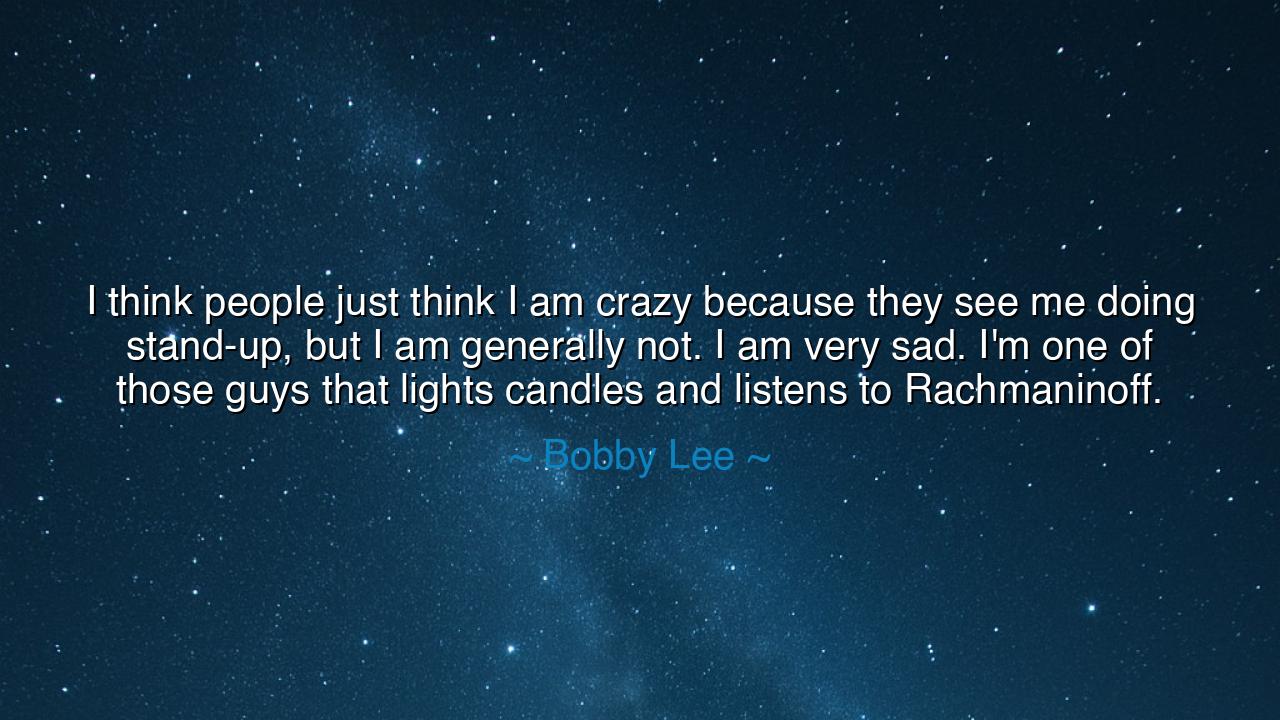
I think people just think I am crazy because they see me doing
I think people just think I am crazy because they see me doing stand-up, but I am generally not. I am very sad. I'm one of those guys that lights candles and listens to Rachmaninoff.






Hear the words of Bobby Lee, who strips away the mask of laughter and reveals the hidden sorrow beneath: “I think people just think I am crazy because they see me doing stand-up, but I am generally not. I am very sad. I’m one of those guys that lights candles and listens to Rachmaninoff.” These words, though spoken of himself, echo through the ages as testimony to a timeless paradox—that those who bring joy to others often carry the heaviest burdens in silence.
The heart of this confession is the duality of the human spirit. In the light of the stage, Bobby appears as a man of boundless energy, wild gestures, and comic madness. The crowd laughs, convinced he is one with his performance. Yet when the curtain falls, the performer is alone with his sadness, lighting candles, retreating into the depths of music as profound as Rachmaninoff’s. This is the eternal truth: what the world sees is often not what the soul endures.
The ancients understood this hidden duality. Recall the tale of Democritus, the laughing philosopher, who mocked the follies of men and appeared joyous to all. Yet he laughed to shield himself from despair at the vanity of human striving. Or think of Robin Williams in our own time, who clothed the world in joy while himself wrestling with storms unseen. Both reveal the lesson found in Bobby Lee’s words: that the mask of comedy often conceals the tears of the heart.
The mention of Rachmaninoff is no accident. For his music, heavy with longing, carries the weight of melancholy, soaring with grandeur yet trembling with sadness. To listen to such music by the glow of candles is to dwell not in madness but in contemplation, to confront one’s own pain in the quietest of sanctuaries. This shows us that Bobby’s so-called craziness is in truth a ritual of survival: he balances the chaos of the stage with the stillness of solitude.
There is a noble vulnerability in admitting, “I am very sad.” In a world that rewards masks, this is an act of courage. It teaches us that even those who appear strong, even those who make us laugh, may themselves be fragile, longing for understanding. It calls us to compassion, to look beyond appearances, to realize that the clown’s painted smile may conceal a trembling soul.
What, then, is the lesson for us? It is this: do not confuse performance with reality, nor laughter with joy. Every soul carries its own burden, and those who entertain us may themselves hunger for solace. Let us therefore approach others with gentleness, not assuming we know their hearts by what they show us. And let us not be ashamed of our own sadness, for in naming it, we begin to lighten its weight.
Practical wisdom follows: when you feel sorrow, do not mask it endlessly in noise. Find your own candle-lit rituals, your own Rachmaninoff—those sacred practices that allow your soul to breathe. Offer compassion to those who seem the strongest in public, for they may be the most fragile in private. And when joy is yours to give, give it freely, but let not your own heart be neglected in the process.
Thus, Bobby Lee’s words endure as a torch of hidden truth: that behind stand-up, behind craziness, there may be quiet sadness, and behind sadness, a deep humanity. May we honor both masks and faces, both laughter and tears, knowing that to embrace the full span of the human spirit is to live wisely and well.






AAdministratorAdministrator
Welcome, honored guests. Please leave a comment, we will respond soon